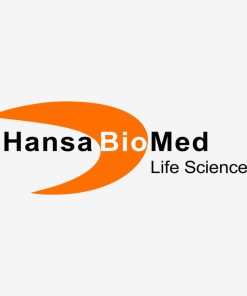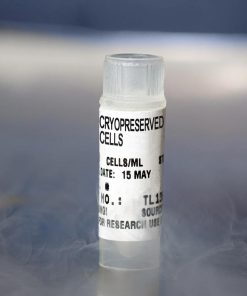Human bronchial smooth muscle cells are isolated from the major bronchia of asthmatic donors. Asthma is an inflammatory disorder of the airways, which causes attacks of wheezing, shortness of breath, chest tightness, and coughing in patients. Degrees of severity are unique to individual patients as are responses to drug trea™ents. Adhesion of eosinophils to bronchial epithelial cells, and the interaction of airway smooth muscle and sub-epithelial fibroblasts play a critical role in asthma pathology. During an asthma attack bronchiole smooth muscle tissue can constrict and decrease the flow of air in the airways. The amount of air flow can further be decreased by inflammation or excess mucus secretion. Cryopreserved Diseased Bronchial Smooth Muscle cells stain positive for alpha smooth muscle actin and negative for von Willebrandfactor VIII. All cells test negative for mycoplasma, bacteria, yeast, and fungi. HIV-1, hepatitis B and hepatitisC are not detected for all donors and/or cell lots. A Certificate of Analysisis provided for each cell lot purchased. Asthma is an inflammatory disorder of the airways, which causes attacks of wheezing, shortness of breath, chest tightness, and coughing in patients. Degrees of severity are unique to individual patients as are responses to drug trea™ents. Adhesion of eosinophils to bronchial epithelial cells, and the interaction of airway smooth muscle and sub-epithelial fibroblasts play a critical role in asthma pathology. During an asthma attack bronchiole smooth muscle tissue can constrict and decrease the flow of air in the airways. The amount of air flow can further be decreased by inflammation or excess mucus secretion. Cryopreserved Diseased Bronchial Smooth Muscle cells stain positive for alpha smooth muscle actin and negative for von Willebrandfactor VIII. All cells test negative for mycoplasma, bacteria, yeast, and fungi. HIV-1, hepatitis B and hepatitisC are not detected for all donors and/or cell lots. A Certificate of Analysisis provided for each cell lot purchased. Pulmonary fibroblasts (PF) play an important role in the repair and remodeling processes following injury. The controlled accumulation of fibroblasts to sites of inflammation is crucial to effective tissue repair after injury. Either inadequate or excessive accumulation of fibroblasts could result in abnormal tissue function. For example, the excess proliferation of fibroblasts contributes to the adventitial thickening observed during the development of hypoxia-induced pulmonary hypertension. Cryopreserved Diseased Lung Fibroblasts from Cystic Fibrosis donors stain negative for von Willebrand factor VIII, cytokeratins 18 and 19, and alpha smooth muscle actin. All cells test negative for mycoplasma, bacteria, yeast, and fungi. HIV-1, hepatitis B and hepatitis C are not detected for all donors and/or cell lots. A Certificate of Analysis is provided for each cell lot purchased.
Endotoxin and Pyrogen Testing Products
The next chapter in endotoxin testing... Let's write it together.




